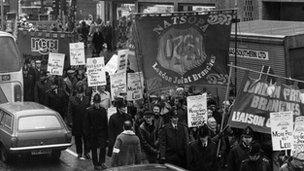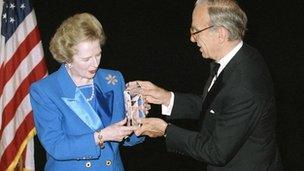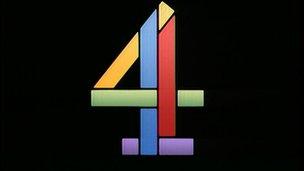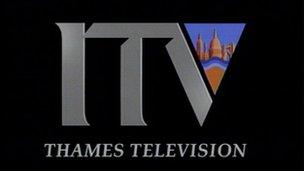How Margaret Thatcher helped change media landscape
- Published
Baroness Thatcher has dominated the media this week - and is set to do so for several days to come. But it's a very different media world from the one she inherited on entering Downing Street - and not just because of the internet, Twitter and Facebook.
When Margaret Thatcher became Britain's first woman prime minister in May 1979, The Times didn't report the fact. It had stopped publication because of an industrial dispute which closed it for 11 months. So had its sister paper the Sunday Times., external
Within three months, ITV was also on strike, external, blacking out all television advertising in the UK for 11 weeks.

Hundreds of workers from The Times and Sunday Times marched through Fleet Street while on strike in 1979
Those lengthy shutdowns are a reminder of just how different life was in 1979 and how the media business was transformed by her time in office:
Baroness Thatcher helped Rupert Murdoch break the power of the print unions at Wapping, paving the way for new titles such as the Independent and bigger, multi-section newspapers.
She broke the TV duopoly of ITV and the BBC - through the launch of Channel 4, independent producers and the breakfast station TV-am.
She privatised the TV transmitter networks and allowed ITV licences to be awarded to the highest bidder.
She unleashed the UK's advertising sector, assisted by Saatchi & Saatchi - which helped her into Downing Street with its Labour Isn't Working poster, external - and grew to become the world's largest advertising group. The ad business also reaped a multi-million-pound bonanza from the privatisation campaigns for British Telecom, British Gas and the TSB.
And she crossed swords many times with the BBC, though it survived her attempts to break it up and scrap the licence fee.
In 1979, as in many areas of industry, leaders of the printing, broadcasting and telecoms unions ruled the roost, as Rupert Murdoch recalled in a personal tribute to Margaret Thatcher in The Times this week. , external
"We were stuck with an industry that refused to change its ways" he wrote. "There were constant threats to go slow, to stop the presses or to walk out altogether. It couldn't go on."
The restrictive practices inflated the pay of union members (both in newspapers and broadcasting), reduced company profits and protected over-manning, in the face of new technology already commonplace in other countries.
British newspapers were printed only in black-and-white (colour was confined to the supplements) and the number of pages and sections was severely limited.
But it wasn't only the unions that imposed restrictions.
Copyright on TV listings meant newspapers couldn't print the next day's programme schedules - let alone the next week's.
Viewers had to buy both Radio Times (for BBC programmes) and TV Times (for ITV) to find out what would be on, protecting the broadcasters' lucrative publishing duopoly.
And under Government control of the airwaves, ITV was the only television channel allowed to show commercials, which it sold through 15 regional monopolies. Only in London could advertisers negotiate with rival companies, Thames and London Weekend Television.
But the seeds of the transformation had already been sown.
Margaret Thatcher was elected with a public mandate to "tame the unions" following Labour's Winter of Discontent in 1978-9 - which left bodies unburied and mountains of uncollected rubbish. She introduced industrial relations legislation which outlawed closed shops, secondary picketing and made secret ballots compulsory instead of mass show-of-hands voting.
Taking advantage of the new laws, Murdoch decided to break the unions' power, secretly moving his four national newspapers to a new plant in Wapping, east London, which used the new computerised technology.
Mrs Thatcher had strengthened Murdoch's hand by letting him take over The Times and the Sunday Times, external, even though he already owned the Sun and the News of the World.
The previous owners, the Thomson Organisation, had decided to sell after the 11-month closure. The last straw was when their journalists - who had received full pay throughout the dispute - voted to go on strike themselves.
The Times had made losses for many years but the Sunday Times - with a large circulation and packed with advertising - was assumed to be very profitable. To many people's surprise, the Thatcher government permitted the takeover without referring it to the Monopolies and Mergers Commission.

Margaret Thatcher allowed Rupert Murdoch to take over The Times and Sunday Times
The former editor of the Sunday Times, Sir Harold Evans, wrote: "A newspaper merger unprecedented in history went through in three days."
The decision was formally taken by the Secretary of State for Trade, John Biffen, on the grounds that the two papers were not going concerns and could close if the takeover were delayed by an MMC investigation.
The ruling was hotly criticised in parliament and the press. In his book Good Times, Bad Times, Sir Harold reported that Mrs Thatcher was the architect of the deal.
"Normally the apostle of competition, on this occasion the lady was ready for turning: the U-turn she executed was in the expectation that Murdoch's affinity with her politics would impel him to ensure favourable coverage."
For many years it was denied - not least in the official history of The Times - that the two had met in the run-up to the bid being cleared. But in 2012 it emerged, from papers released under the 30-year rule, that Murdoch had had a secret lunch with Mrs Thatcher at Chequers to put his plans to her. , external
Evans wrote that the meeting "that never took place" was "highly improper". Mrs Thatcher's press spokesman Bernard Ingham - in a note of the meeting - claimed that she did nothing more than "wish him well in his bid" and noted the need to improve Fleet Street staffing levels and to introduce new technology.
With four national newspapers - two daily, two Sunday, quality as well as popular - Murdoch was now in a stronger position to take on the unions at Wapping. In January 1986, he made his move. The resulting dispute - which led to violent battles between police and pickets, external - lasted months, reinforcing the media mogul's reputation as a hate-figure among the left. Eventually Murdoch won, not merely increasing his papers' profitability but helping his rivals to introduce the new technology, as well as new entrants to the market such as the Independent.
Andrew Neil, then the editor of the Sunday Times, said on Radio 4's The Media Show this week that Thatcher played a crucial role in the publisher's victory, and not just by outlawing secondary picketing.
He said Rupert Murdoch had told him that "he had squared Mrs Thatcher as far as the police were concerned, that he'd had a guarantee from her that enough police would be made available to keep the company going about its lawful business".

Channel 4 launched in November 1982
He went on: "I remember it well because he compared it with New York - he had not attempted this with the New York Post because he didn't think the mayor could deliver on that and he didn't think he could count on the police if he tried to do the same there."
The Thatcher government was also trying to shake up broadcasting.
After numerous rows with the BBC, over issues such as the coverage of the Falklands Conflict in 1982, the Real Lives documentary on Northern Ireland terrorism, and the bombing of Libya in 1986, Mrs Thatcher hoped to cut the corporation down to size.
She set up the Peacock Committee to examine whether the BBC could be funded by advertising, so the licence fee could be scrapped. "Ideologically she was very opposed to the BBC, perceiving it to be very left-wing," said Professor Patrick Barwise of the London Business School, who was advising the corporation at the time.
On The Media Show, he said: "It took us a very short time to persuade the committee it wasn't a runner. , externalIf you'd had advertising on the BBC, the revenue would have come from ITV and you'd have had less money for programmes."
Meanwhile, a new BBC director general, John Birt, was making radical changes at the corporation, which were highly unpopular with its staff. His supporters say that stopped the Thatcher government breaking up the BBC and selling off stations like Radio 1.
Instead, she turned her attention to ITV. In 1987, at a Downing Street summit, Mrs Thatcher told ITV bosses that their industry was "the last bastion of restrictive practices". , external
In her memoirs, The Downing Street Years, she wrote: "Broadcasting was one of a number of areas in which special pleading by powerful interest groups was disguised as high-minded commitment to some greater good."
Attempts to break the powerful duopoly which the BBC and ITV had achieved - which encouraged restrictive practices, increased costs and kept out talent - were decried as threatening the 'quality of broadcasting'."
The first shake-up came with the launch of Channel 4 in November 1982. An earlier government report had concluded that "the younger generation of producers is bubbling over with ideas which are not allowed to surface", and the Thatcher government decreed that most of its programmes should be provided by a new breed of 'independent producers'.

Thames Television was outbid for the ITV London licence by Carlton TV in 1991
Phil Redmond, creator of Brookside, was one of them. On its 30th anniversary, he wrote: "In 1982 there were only three television channels and the country was in the grip of a deep recession with Margaret Thatcher in power. Then along came Channel 4. It made a huge, immediate impact as it was given the remit to cater for minorities and find voices that were unheard, external - and it certainly lived up to that. It allowed new people to be seen on TV, with new ideas and voices."
But the biggest shake-up in commercial television came from the decision to award ITV licences to the highest bidder, subject to a quality hurdle. It was highly controversial. One of ITV's most successful programme-making companies, Thames Television, was outbid by Carlton Television, led by Michael Green.
He had earlier tried to buy Thames but been prevented from doing so by the regulator, the Independent Broadcasting Authority, as he described on The Media Show. , external
The licence process had an unexpected - and unwelcome - outcome for Mrs Thatcher.
The man often described as her favourite TV executive, Bruce Gyngell, had turned the ailing breakfast station TV-am into profit, and kept it on the air during a union dispute in 1987 - helping transform working practices in the industry. But TV-am was beaten by an unrealistically high bid from GMTV.
Mr Gyngell later received a letter from the prime minister, which caused a sensation when he read it out at an awards lunch., external
"When I see how some of the other licences have been awarded," she wrote, "I am mystified that you did not receive yours, and heartbroken . . . I am only too painfully aware that I was responsible for the legislation."